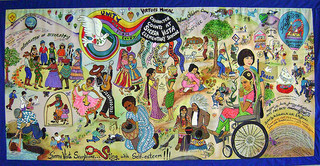Virtue Assignment and Virtue Categories Under the Progressive Worldview
While traditional Americans think goodness is defined by objective standards such as the Ten Commandments, newthinkers believe they are progressively virtuous due to their inherently noble motives.
The unconscious logic supporting this belief is as follows, starting from the “Human beings are inherently and transcendentally noble” branch of the newthink worldview tree:
• Human beings are inherently and transcendentally noble.
• Our motives are inherently noble.
• We are progressively virtuous.
Humans have a deep and compelling psychological need to assign virtue. Based on a particular morality – a set of rules about what’s right and wrong – people assign virtue by dividing actions into two categories: virtuous and non-virtuous.
virtue assignment n : a psychological process which categorizes actions into two categories: virtuous or non-virtuous, based on the existing morality
virtue categories n : bipolar designations based on the judgement of righteousness under a given system
People fundamentally need to define virtue and non-virtue in their world, and they need to feel personally virtuous (even when they obviously aren’t). Systems of virtue assignment are central to worldviews because they create conviction, cement loyalties and inspire action.
Progressive virtue and progressive non-virtue are newthink’s virtue categories, based on the political correctness system. Good and evil are Americanism’s virtue categories, based on its system.
Progressive virtue and progressive non-virtue are newthink’s virtue categories, based on the political correctness system. Good and evil are Americanism’s virtue categories, based on its system. Among devout progressives, progressive virtue has replaced good and progressive non-virtue has replaced evil. These different systems of virtue assignment are foreign and incompatible with each other. They coexist uneasily and won’t be at rest until one defeats the other.

Virtues Mural – Sierra Vista Elementary (Photo credit: Edith OSB)
When assigning virtue, the less discriminating, whatever their worldview, conflate actions with individuals and even groups. For instance, say that Fred lied about something. Conflating that action with an individual, one would make a virtue assignment about Fred the individual: Fred lied, so he’s bad. Conflating that action with a group, one might think: Fred is a Yabbadabbadoobian, so they’re all bad. While the process of virtue assignment is universal, the dynamic changes as newthink takes hold. It changes, not just because the rules are different, but because the definitions of groups alter, as we’ll see later when I discuss newthink’s society metaphor.
Related articles
 Virtues and Reasons: Solving the Problem of Priority
Virtues and Reasons: Solving the Problem of Priority Virtues
Virtues My favorite theory
My favorite theory Nicomachean Ethics
Nicomachean Ethics
Tagged: progressive virtue, virtue categories











